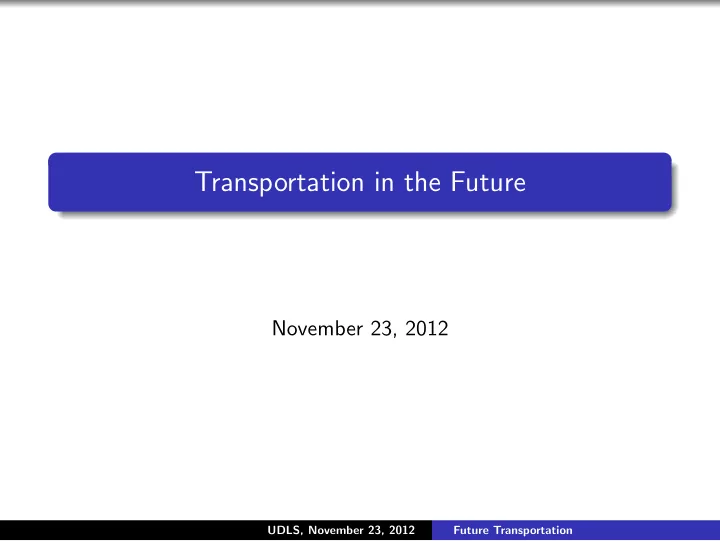

Transportation in the Future November 23, 2012 UDLS, November 23, 2012 Future Transportation
Then and Now ...
Road Ford T (1908): IC Engine; 65-72 km/h UDLS, November 23, 2012 Future Transportation
Miura Lamborghini Miura (1968): IC Engine; 275 km/h UDLS, November 23, 2012 Future Transportation
Road Bugatti Veyron (2005): IC Engine; 430 km/h UDLS, November 23, 2012 Future Transportation
Rail Mallard (1938): Steam; 160 km/h UDLS, November 23, 2012 Future Transportation
Rail Shinkasen (1967): Electric; 220 km/h UDLS, November 23, 2012 Future Transportation
Rail Shinkasen (2011): Electric; 300 km/h UDLS, November 23, 2012 Future Transportation
... and Ahead ...
Driverless Cars Accidents are the leading cause of deaths Commuting time leads to loss of productivity UDLS, November 23, 2012 Future Transportation
Driverless Cars Timeline First DARPA Challenge: 2004 2005: Won by Stanford’s Stanley 2007: Urban Challenge – CMU’s Tartan Team Today: Google’s Driverless Cars 2012: Road legal in California and Nevada UDLS, November 23, 2012 Future Transportation
Technology GPS – static positioning Radar – obstacles Cameras – read and process road signs UDLS, November 23, 2012 Future Transportation
Videos DARPA: http://www.youtube.com/watch?v=LZ3bbHTsOL4 Google: http://www.youtube.com/watch?v=J17Qgc4a8xY UDLS, November 23, 2012 Future Transportation
Benefits No fatigue Self-parking Reduce lane widths UDLS, November 23, 2012 Future Transportation
Ultra High Speed Trains Main limiting factor in speed is friction Sources: air resistance and rolling resistance Vacuum tunnels and magnetic levitation (MagLev) UDLS, November 23, 2012 Future Transportation
Speed and Energy Speed could be in excess of 5000 km/h Sound barrier, but no sonic boom Energy only used for acceleration and retardation UDLS, November 23, 2012 Future Transportation
MagLev Trains Two in operation: Shanghai (China) and Mizayaki (Japan) Can be electromagnetic or electrodynamic UDLS, November 23, 2012 Future Transportation
Electromagnetic Suspension (EMS) Underside of train has large C-shaped electromagnets Repelled by the steel underside of the track Levitates by around an inch UDLS, November 23, 2012 Future Transportation
Electrodynamic Suspension (EDS) Magnets on both the train and the track underside Levitates around 4 inches UDLS, November 23, 2012 Future Transportation
EMS vs EDS EMS systems require less magnetic fields EMS are less stable and need constant monitoring EMS also function at low speeds EDS are more stable due to presence of multiple magnets Need to be shielded, else would affect pacemakers UDLS, November 23, 2012 Future Transportation
Vacuum Tubes Air resistance prevents MagLev’s from going faster than 600 km/h Vaccum tubes: large, hollow tubes that MagLevs can travel in Partially evaluated tunnels are useful to UDLS, November 23, 2012 Future Transportation
Problems with Vacuum Tubes Expensive to build Maintaining a vacuum is expensive; proposals have suggested a global, interconnected network of tubes Depressurizing chambers on either end to allow vehicles to gently normalize pressure Single points of failure and attractive terrorist attack sites UDLS, November 23, 2012 Future Transportation
What about Space? Even more desperately in need of an overhaul Space elevators and Loftstrom loops are possible future plans Too lazy to talk about them today UDLS, November 23, 2012 Future Transportation
Conclusion The future is here UDLS, November 23, 2012 Future Transportation
Conclusion The future is here Well it’s almost here UDLS, November 23, 2012 Future Transportation
Conclusion The future is here Well it’s almost here Actually, it’s almost almost here UDLS, November 23, 2012 Future Transportation
Conclusion The future is here Well it’s almost here Actually, it’s almost almost here Translink doesn’t represent the future Leave early to make it to beer call in time! UDLS, November 23, 2012 Future Transportation
Recommend
More recommend